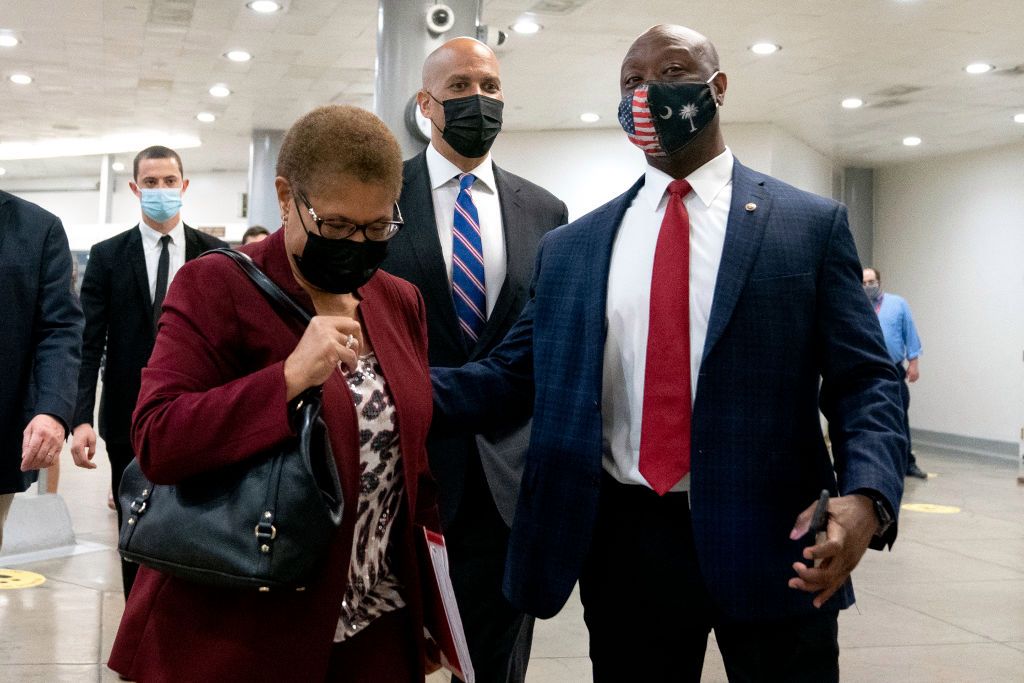
Source: Stefani Reynolds / Getty
Republican Sen. Tim Scott has refused to budge from his position on qualified immunity, holding up federal action on legislation centered on police reform in America. He, along with Democrats Sen. Cory Booker and Rep. Karen Bass, is working through various elements of policing and prosecution.
The three lawmakers, all Black, are working against the clock to agree to move forward the George Floyd Justice in Policing Act. President Joe Biden set a deadline to have a deal in place by the anniversary of George Floyd’s killing on May 25. Bass told CNN it was more important to get the bill’s substance right than worrying about timelines.
“We’re trying to create a vast bill that covers a lot of things,” Booker added.
Noting the bipartisan support for many provisions, Booker said the challenge is crafting a bill to address the challenges in policing.
“And the challenges go from the abject continued violation of people’s rights that we see all the way to the real mental health issues that are affecting the policing profession, are real challenges that police are having even right now,” continued Booker.
Bass, Booker and Scott have reached a common ground around no-knock warrants, the 1033 program, which gives military-grade weapons to local police departments and chokeholds. As written, the bill will also create a national database for police misconduct.
CNN reported Democrats want to change the standard for prosecuting police at the federal level. Bass and Booker sought guidance from the Department Of Justice (DOJ) on changes, but Scott does not think they should change the standard.
Scott wants to see departments take more responsibility without holding individual officers accountable. An April poll from Vox and Data for Progress found more than 50 percent of respondents favored curbing qualified immunity for police officers, making it easier to sue individual officers.
The bill would also lower the standard for criminal prosecutions. Per the DOJ, police officers can be prosecuted under Section 242 for the willful deprivation of a person’s rights while acting in their official capacity.
The Justice in Policing Act would lower the threshold for conviction from willful to knowing or reckless. Political commentator Angela Rye recently broke down the proposed legislation, with a special word on section 242 prosecutions.
The high standard for finding police conduct to be criminal is often a bar to holding individual officers accountable. Most times, such as in the seemingly open-and-shut case of officers who killed Tamir Rice, the DOJ will not bring charges.
Section 242 prosecutions are difficult under existing law, and charges are rare. In December, federal prosecutors determined the action of the officers who killed young Tamir did not rise to a criminal nature under the existing statute. The DOJ found the officers’ conduct did not rise to the level of willful intent to be proven beyond a reasonable doubt.
Even when charges can be brought, such as in the case of St. Louis officers who brutally beat a Black undercover cop, it’s often difficult to prove to a federal jury that the standard has been met.
Meanwhile, polling shows that more than half of Americans want meaningful action on policing and are looking to Congress to take action.
SEE ALSO:
Civil Rights Leaders Applaud As House Passes The George Floyd Justice In Policing Act
Landmark Police Reform Bill Addresses Funding, Chokeholds, Lynching And Accountability
[ione_media_gallery id=”3440564″ overlay=”true”]
